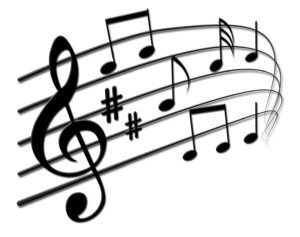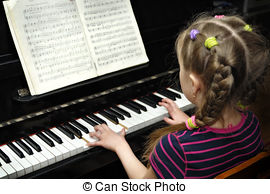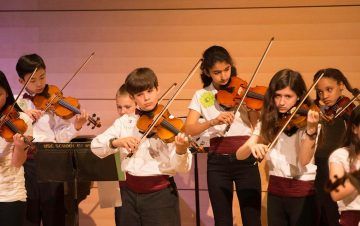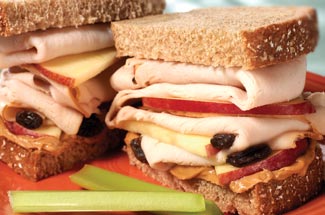by Carol A Westbrook
 I began taking piano lessons when I was 8 years old, along with Lynn, my older and Mark, one of my brothers. Every Wednesday we’d walk together from school to a small storefront on Milwaukee Avenue about a half mile away. The store windows were covered in drapes, with a little sign indicating the teacher’s name and PIANO LESSONS. My sister gave her the $3 for three lessons, and we entered the small studio, which had a grand piano and a sofa, bookshelves, and a heavy, dusty drape separating the studio from the living quarters. We’d each wait patiently, doing our homework on the sofa while the other one had his or her lesson.
I began taking piano lessons when I was 8 years old, along with Lynn, my older and Mark, one of my brothers. Every Wednesday we’d walk together from school to a small storefront on Milwaukee Avenue about a half mile away. The store windows were covered in drapes, with a little sign indicating the teacher’s name and PIANO LESSONS. My sister gave her the $3 for three lessons, and we entered the small studio, which had a grand piano and a sofa, bookshelves, and a heavy, dusty drape separating the studio from the living quarters. We’d each wait patiently, doing our homework on the sofa while the other one had his or her lesson.
 We enjoyed learning the piano, but didn’t enjoy Mrs. K. She was creepy. We thought she might have been a Roma fortune teller or a magician, as she wore strange jewelry and shawls, and had Persian carpets and draperies around her studio. To us kids she looked about 90 years old (probably more like 40). She was actually a rather unsuccessful concert pianist, and memorabilia was scattered around the studio such as notices of performances and autographed pictures of famous conductors. She didn’t talk about it much her past life at all, as she was reduced to teaching piano lessons to the blue-collar neighborhood kids like ourselves. We persisted with lessons because we always did as we were told. We went home and put in our half-hour of practice on the second-hand but well-tuned piano that dad bought for us, and little by little we began to learn how to play.
We enjoyed learning the piano, but didn’t enjoy Mrs. K. She was creepy. We thought she might have been a Roma fortune teller or a magician, as she wore strange jewelry and shawls, and had Persian carpets and draperies around her studio. To us kids she looked about 90 years old (probably more like 40). She was actually a rather unsuccessful concert pianist, and memorabilia was scattered around the studio such as notices of performances and autographed pictures of famous conductors. She didn’t talk about it much her past life at all, as she was reduced to teaching piano lessons to the blue-collar neighborhood kids like ourselves. We persisted with lessons because we always did as we were told. We went home and put in our half-hour of practice on the second-hand but well-tuned piano that dad bought for us, and little by little we began to learn how to play.
Mrs. K died 2 years later. In fact, she died on our watch. She started getting weak and tired at every lesson, eventually lying on the sofa instead of sitting next to us on the piano bench. She would give us a few dollars to run out to the store get a carton of milk or juice for her, and was always added an extra 5¢ for a candy bar. We thought she was just getting lazy, but one day we came in for our lessons and she could barely move or speak. We called our mother, who rushed over and took charge and called an ambulance. She died the next day of cancer. We felt bad that she died a lonely old lady with no children or husband, and we didn’t know enough to tell she was ill.
After Mrs. K died, mom found another teacher for me. Sister Euphemia was a nun who taught piano at the nearby Catholic girls’ high school which I would attend after 8th grade. Sister was a demanding teacher, and she worked me hard, but I became quite good under her tutelage. I practiced hours every evening, partly because the music was hard and partly because I found it relaxing. I could lose myself, as if I were meditating. I became quite a good pianist, and was often called upon to be the accompanist to rehearse our high school musicals, or play at school assemblies. I loved doing that, the notoriety and the applause. I loved the show tunes and still enjoy playing them.

I was never tempted to become a professional musician. Not only did I have other plans for my career, I knew I wasn’t a good musician. There’s a big difference between “proficient” and “virtuoso.” I didn’t want to end up like Mrs. K., a failed concert pianist who life passed by, with no family and few friends, reduced to teaching piano lessons and living on the edge of poverty. I knew I’d never be a great musician. It takes more than simple talent to be a virtuoso, and we may never know what is the combination of traits that determine this, any more than we can say what makes a Mozart or Rembrandt or a Van Gogh.
Anyone can take lessons. Studies have shown that you could become proficient in just about any skill, from sports to playing guitar, after you have put in about 10,000 hours of practice. But that doesn’t lead to musical ability. Putting in your hours is learning by memorization and rote; children who don’t have musical ability will hate it and quit when they have the chance. Or when their piano teacher dies.
For others, music lessons just “click” and they find they can do it easily. Playing a specific piece may require practice, but most acquire the ability to look at the music and play what they see, rather than process it, think about it, and do it by rote. I how I could see the chord patterns in the left hand and execute them while concentrating on the melody played by the right. Not unlike touch typing. I did need to run through the piece once or twice to get the fingering accurate and to learn the difficult parts. This is not very different from the way some people learn languages and speak naturally, while others have to memorize the words and think about each one. Even now, after not having practiced seriously in decades, I can sit down at the piano and look at music that I had previously played, and execute it fairly well. This music-hand connection is a critical component of musical talent.
Wouldn’t it be nice if we had a DNA test or other test that could tell which of our children have musical ability and which do not? Why spend the money and effort for weekly piano lessons, why put a down payment on that piano, when your kid will quit? How can we tell if a child potentially has talent?
Most everyone agrees that musical ability runs in families. For example, in my family, I am a good pianist, and so is my younger brother—the one who didn’t take lessons. That’s 2 out of 4 children, suggesting that it’s an autosomal dominant trait. But it’s more complicated than that My ex-husband was a talented violinist, and so is our oldest son, who started Suzuki lessons with a pint-size violin at age 4, and now can pick up any stringed instrument and play it. Studies in twins and family association studies suggest that about 50% of musical ability is inherited. On the other hand, musical inability (also called tone deafness, lack of music discernment or pitch recognition) is fully 80% inherited!
Researchers have tried to use modern genome methods to link musical ability to genes, and there are many reported studies, but the results are mixed. That’s because it’s hard to define musical talent precisely. Researchers have used various parameters, from self-reported talent, perfect pitch, and singing ability, but these seem to link to different genes. Absolute pitch is the easiest to measure, but true absolute pitch is pretty rare. Some feel math ability tracks with musical ability. When looked at closely, though, it is clear that different genes are involved in these skills, all of which are partially inherited.

Educators hold that music lessons will help a child learn math, but I’m skeptical. Most of the time people who are good at music also have the “math gene.” Whether one skill facilitates the other is an unanswered question. But teachers use it as a justification for schools to keep music on their curriculum, and that is important.
Another possible indicator of music talent is perfect pitch, which is the ability to sing a note correctly from memory. True perfect pitch is easy to measure, but it is present in less than one in 10,000 people, whereas musical ability is much more common. Many musicians, I believer, have “almost perfect pitch, singing from memory the requested note or one very close to it. This is a learned skill. This makes it easier to sight-read music and follow the melody, or sing from a score, without having been to learn the song first. I can do this to some extent, and so can my youngest brother. (We also both have math talent, too).
Recently a gene has been identified that seems to track with musical ability. It’s a variant of a gene called AVPR1A on chromosome 12q, which a receptor for arginine-vasopressin (AVP or ADH). AVPR1A is known to have a central role as a messenger molecule in the brain, participating in the control of cognitive aspects of music learning, including music perception, music memory, and music listening. It is also involved in the neurobiological pathways affecting human social functioning. It’s not surprising that musical activities are related to these social skills, but it still doesn’t explain how a modified form of this receptor actually helps musical talent. And the truth is that many other genes have been implicated in musical skills, including one on 8q linked to perfect pitch and music perception, while SLC6A4 on chromosome 17q has been linked to music memory and choir skills. The picture is indeed confusing, but it does show that making and enjoying music is a built-in part of human nature, like birdsong is a basic part of the nature of birds.
Clearly, though, AVPR1A is important in succeeding at music lessons. And that makes sense, because music is a social skill and present in every society, and arginine-vasopressin helps to regulate these pathways. As the name suggests, arginine is a part of this molecule. Arginine is a semi-essential amino acid—children require it in their diet, but adults do not since the adult body can make it. This amino acid is present in so many foods that arginine deficiency is almost non-existent. But would increasing the amount of arginine in the diet help? Some foods are especially high in this amino acid. The highest is turkey breast, and the next highest are pork and chicken. Other good sources include pumpkin seeds, soybeans, peanuts and lentils, and dairy.
I could go on, but I need to excuse myself to make a turkey-peanut butter sandwich on pumpkinseed bread for my grandson. He will be starting piano lessons soon and needs more arginine in his diet.

